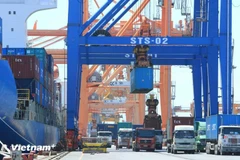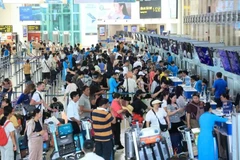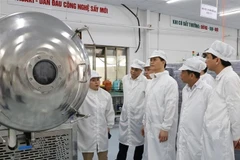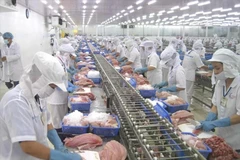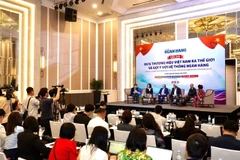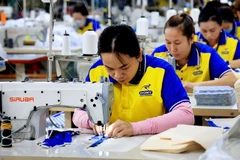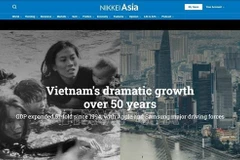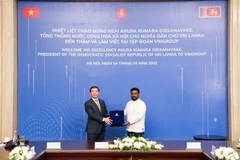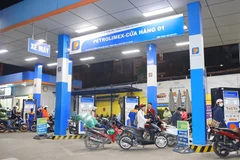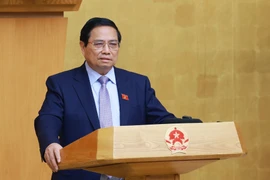The Vietnameseeconomy experienced a year full of difficulties and pressures in 2014but thanks to the efforts of the Government to pursue a consistenteconomic regulation policy, figures have revealed a brighter pictureregarding the performance of the Vietnamese economy.
Thepositive outlook is further underlined by a recent survey by companydata firm Vietnam Report suggesting that only 7.1 percent of enterprisesare pessimistic about their revenues in 2015, compared with 9.1 percentseen in 2013 and 21.9 percent in 2012. So what are the grounds for suchconfidence? First and foremost, the optimism comes from theirperformance in 2014.
One of the most impressive sets of data isthe revenue of Vietnam’s ten largest firms in 2014 which reached nearly2,354 trillion VND (110.6 billion USD), up 14.8 percent from a yearearlier. The rise in revenue was coupled with higher return on assetsand return on equity. This economic optimism is further strengthened bythe largest and best-performing enterprises.
Enterprises’confidence in their accelerated growth reflects great opportunities andlikely leads to a boom for the Vietnamese economy in 2015. In the otherdirection, an economy with promisingly higher growth will also be thecornerstone for enterprises to fare better in an increasinglycompetitive market.
The year of 2015 is anticipated with optimistic forecasts, particularly open opportunities from international integration.
FormerDeputy Prime Minister Vu Khoan emphasised that this special moment forthe Vietnamese economy, when various trade pacts will come into effectthis year, will be a moment that has never been seen before. Thecommencement of the ASEAN Economic Community will create a common marketwith enormous potential. Enterprises are waiting for the expectedopportunities of a larger market and sharp reduction in input costs,product prices and intermediary costs when all markets in the regionsare unified. The new appeal of investment destinations in the region hasbeen expected to create a new hub to attract the world’s investmentflows.
And beyond the region, the Trans-Pacific Partnership withnegotiations expected to finalise in 2015, will generate large flows ofcommodities and money between continents. Therefore the year of 2015 isexpected to create an unlimited area for development and boundlessopportunities for the Vietnamese business community.
Kangaroo Group President Nguyen Thanh Phuong has been preparing for opportunities in 2015 for the past several years.
Hesaid when trade barriers are removed, the reduced time for cargotraffic only is a win for enterprises, especially those exporting toASEAN countries.
Phuong added he has seen the future in 2016when domestic enterprises make a breakthrough in the ASEAN market withproducts labelled Made in Vietnam. However, it should be noted thatopportunities only open up for enterprises demonstrating their dominanceand influence on the market.
There is a clear trend that if thewhole market was to be viewed as a cake, it would be currently dividedinto large portions rather than cut into small pieces. The positive sideis that enterprises of a large enough scale can join the globalproduction and distribution chain in a more convenient way. But thisuneven division has presented a considerable challenge for the entirebusiness community.
A survey by the Vietnam Chamber of Commerceand Industry shows that among Vietnamese enterprises currently inoperation, large and medium-sized companies only account for 2 percentrespectively, while the remaining 96 percent are small and extra-smallbusinesses.
The number of extra-small enterprises, defined ashaving less than ten employees, accounts for up to two thirds of totalenterprises. If household businesses are included, the percentage ofextra-small enterprises can amount to 99.9 percent.
With such asmall scale, there are very few Vietnamese enterprises capable of takingpart in global production networks. Therefore it is not easy to connectwith larger enterprises to share bigger portions of the cake. Moreover,there is not a whole lot of change to the fact that enterprises arebecoming smaller and smaller.
According to the World Bank’supdate on Vietnam’s recent economic developments, domestic private firmshave yet to overcome challenges facing them over the past severalyears.
“Domestic private firms are clearly being impacted by theconstrained access to finance, subdued domestic consumer demand and anuneven playing field”, Nhan Dan quoted the World Bank as saying.
Theabove-mentioned shortcomings make it difficult for domestic enterprisesto move up the value chain, creating two groups of enterprises withseparate operations, namely domestic enterprises and foreign directinvestment (FDI) enterprises.
From a comprehensive view, thereare increasingly less opportunities to acquire market share when one ofthe economy’s greatest challenges is the decreasing size of enterprises.Looking at it in another way, the lack of enterprises capable of takingpart in the global value chain has led to the domestic supply chainbecoming broken and fragmented. The risk here is that potentialinvestors will not come to Vietnam when there are not enterprises strongenough to support their operations. This weakness will worsen whenlabour costs – the main factor that attracts foreign investment intoVietnam – are rising.
Nevertheless, instead of taking on apessimistic outlook for domestic enterprises, many analysts say thatthis is the golden moment for enterprises to shift from the position ofdealing with difficulties to adapting to changes.
Former DeputyPrime Minister Vu Khoan made the comment that macroeconomic stabilityplus numerous laws on business activity, investment environment andmarket mechanisms coming into effect will force enterprises to be moreproactive in their integration plan rather than simply managing to workaround difficulties such as what happened more than a year ago.
Therehave been numerous institutional changes in recently adopted laws with agreater emphasis on the role of market forces. However, the gap betweenlaws and their implementation remains a formidable barrier to animproved business climate in Vietnam. 2015 will be quite a challengingyear for not only enterprises but also the Government in its effort tobuild a healthy and resilient economy, standing firm againstdifficulties and ready to integrate with the world.-VNA
